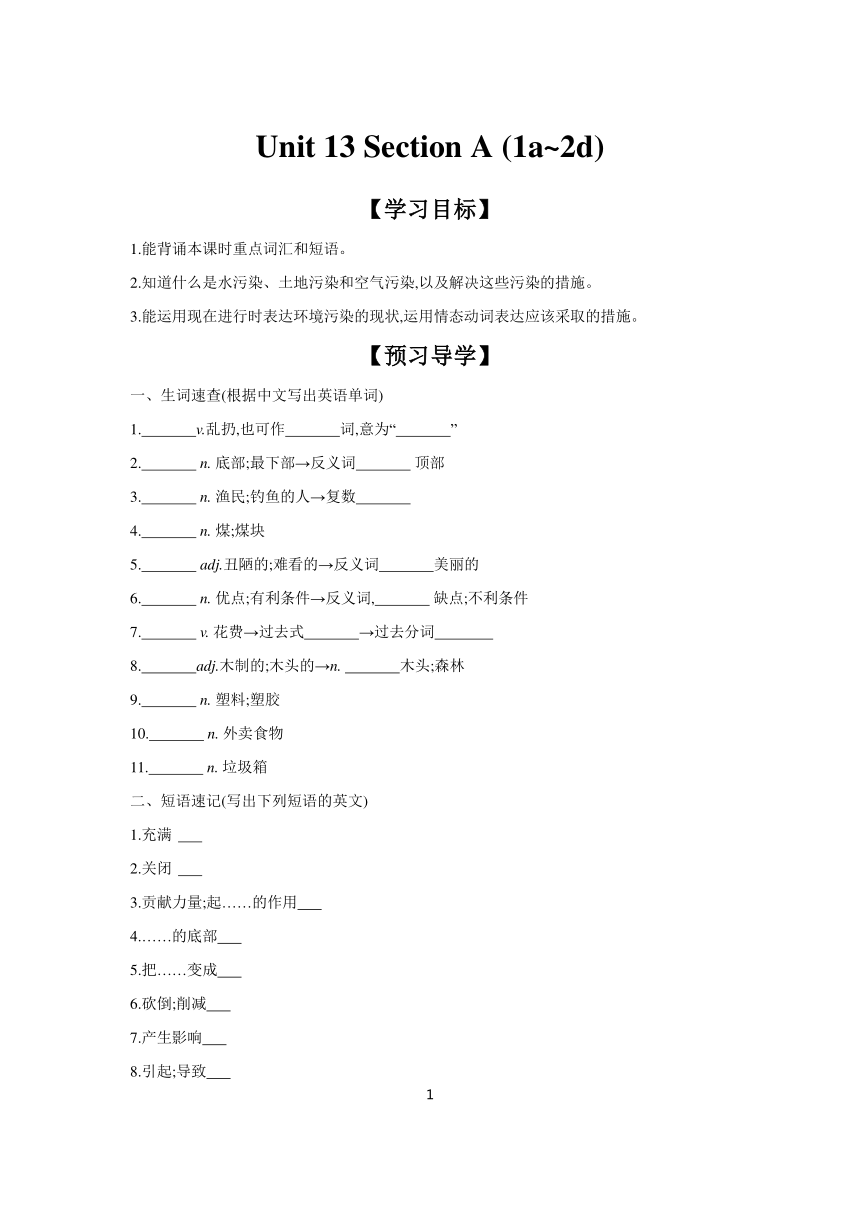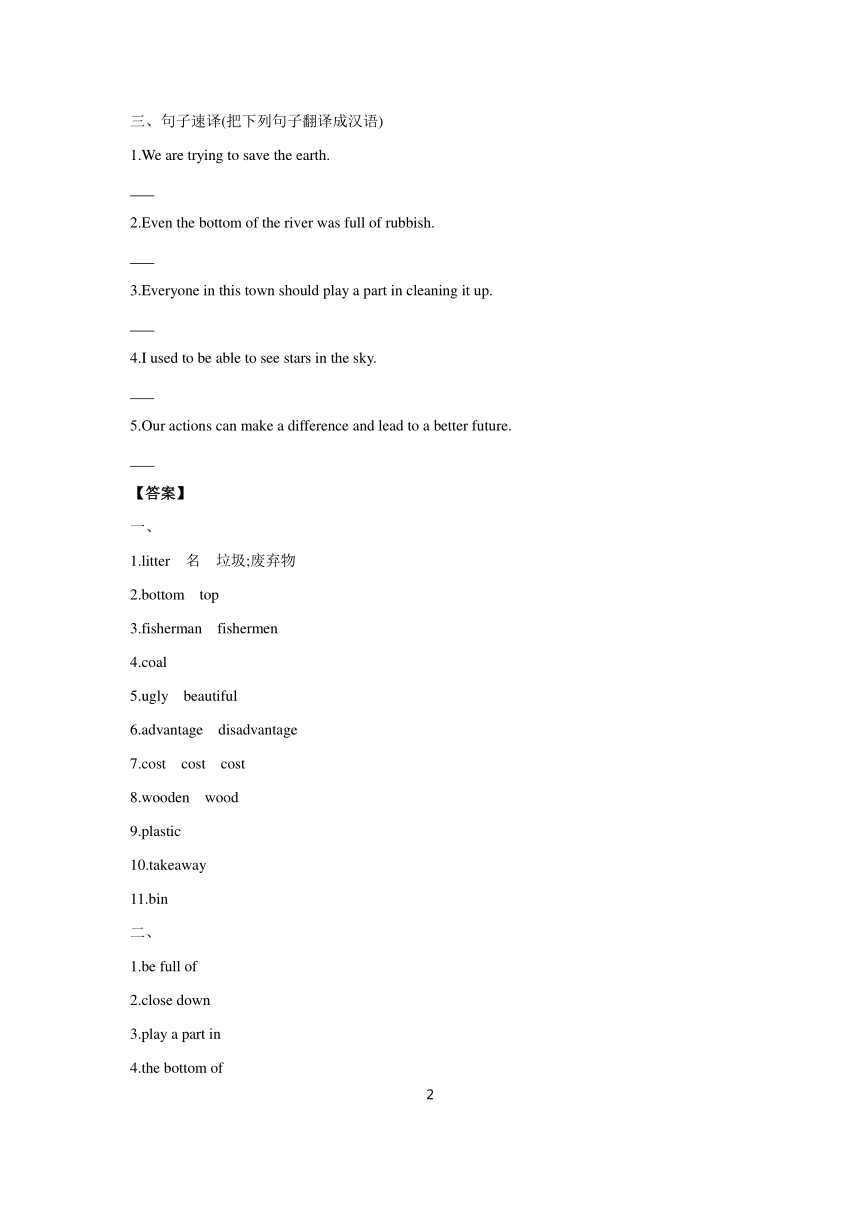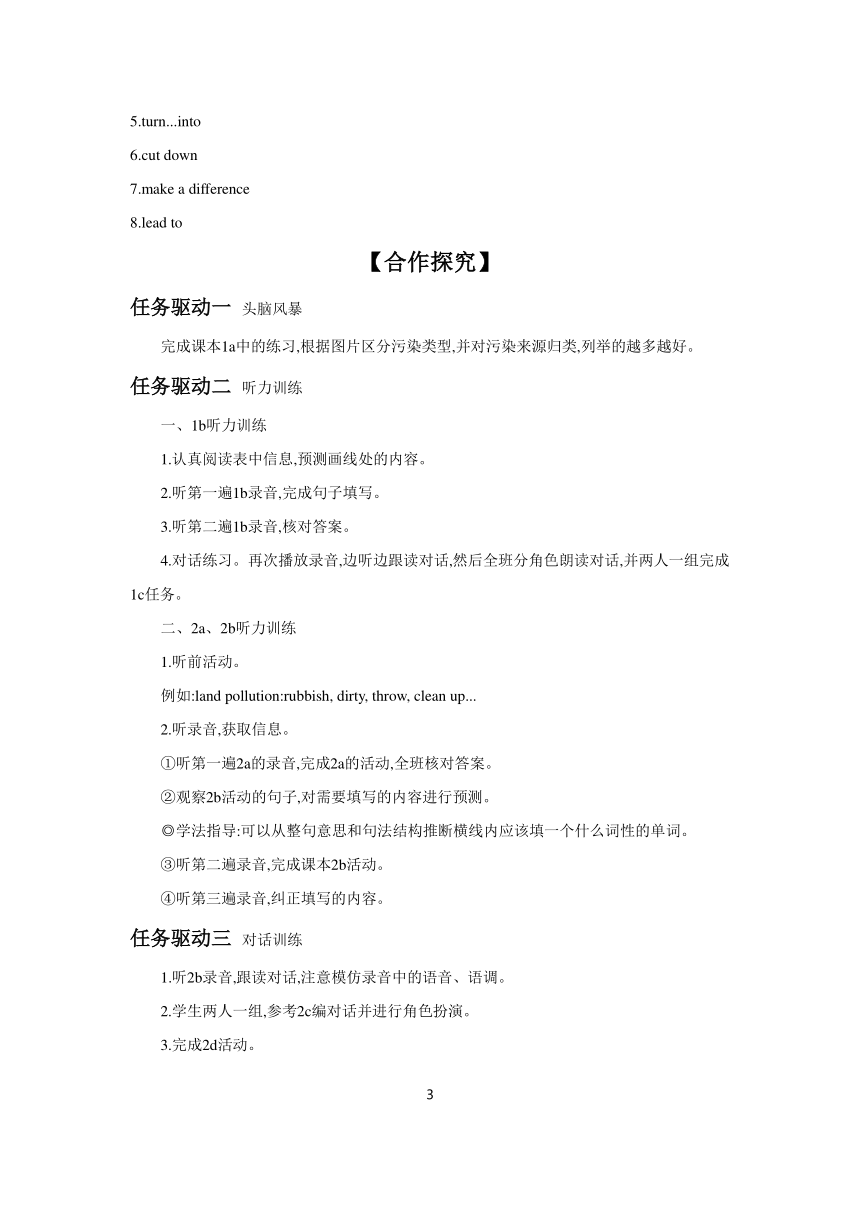Unit 13 We're trying to save the earth! Section A (1a~2d) 学案 (含答案)
文档属性
| 名称 | Unit 13 We're trying to save the earth! Section A (1a~2d) 学案 (含答案) |  | |
| 格式 | docx | ||
| 文件大小 | 25.7KB | ||
| 资源类型 | 教案 | ||
| 版本资源 | 人教新目标(Go for it)版 | ||
| 科目 | 英语 | ||
| 更新时间 | 2024-02-21 18:03:18 | ||
图片预览



文档简介
Unit 13 Section A (1a~2d)
【学习目标】
1.能背诵本课时重点词汇和短语。
2.知道什么是水污染、土地污染和空气污染,以及解决这些污染的措施。
3.能运用现在进行时表达环境污染的现状,运用情态动词表达应该采取的措施。
【预习导学】
一、生词速查(根据中文写出英语单词)
1. v.乱扔,也可作 词,意为“ ”
2. n. 底部;最下部→反义词 顶部
3. n. 渔民;钓鱼的人→复数
4. n. 煤;煤块
5. adj.丑陋的;难看的→反义词 美丽的
6. n. 优点;有利条件→反义词, 缺点;不利条件
7. v. 花费→过去式 →过去分词
8. adj.木制的;木头的→n. 木头;森林
9. n. 塑料;塑胶
10. n. 外卖食物
11. n. 垃圾箱
二、短语速记(写出下列短语的英文)
1.充满
2.关闭
3.贡献力量;起……的作用
4.……的底部
5.把……变成
6.砍倒;削减
7.产生影响
8.引起;导致
三、句子速译(把下列句子翻译成汉语)
1.We are trying to save the earth.
2.Even the bottom of the river was full of rubbish.
3.Everyone in this town should play a part in cleaning it up.
4.I used to be able to see stars in the sky.
5.Our actions can make a difference and lead to a better future.
【答案】
一、
1.litter 名 垃圾;废弃物
2.bottom top
3.fisherman fishermen
4.coal
5.ugly beautiful
6.advantage disadvantage
7.cost cost cost
8.wooden wood
9.plastic
10.takeaway
11.bin
二、
1.be full of
2.close down
3.play a part in
4.the bottom of
5.turn...into
6.cut down
7.make a difference
8.lead to
【合作探究】
任务驱动一 头脑风暴
完成课本1a中的练习,根据图片区分污染类型,并对污染来源归类,列举的越多越好。
任务驱动二 听力训练
一、1b听力训练
1.认真阅读表中信息,预测画线处的内容。
2.听第一遍1b录音,完成句子填写。
3.听第二遍1b录音,核对答案。
4.对话练习。再次播放录音,边听边跟读对话,然后全班分角色朗读对话,并两人一组完成1c任务。
二、2a、2b听力训练
1.听前活动。
例如:land pollution:rubbish, dirty, throw, clean up...
2.听录音,获取信息。
①听第一遍2a的录音,完成2a的活动,全班核对答案。
②观察2b活动的句子,对需要填写的内容进行预测。
◎学法指导:可以从整句意思和句法结构推断横线内应该填一个什么词性的单词。
③听第二遍录音,完成课本2b活动。
④听第三遍录音,纠正填写的内容。
任务驱动三 对话训练
1.听2b录音,跟读对话,注意模仿录音中的语音、语调。
2.学生两人一组,参考2c编对话并进行角色扮演。
3.完成2d活动。
Step 1.语境导入。请同学们思考下面的问题:
What are your ideas for solving the air pollution/waste pollution problem
Step 2.快速阅读2d对话,找出其中谈及的环境问题。
Step 3.再次阅读2d对话,找出关于空气污染和垃圾污染问题的解决办法,填写以下表格。
Pollution Ways to solve the problem
Air pollution
Waste pollution
Step 4.尝试在不看课本的情况下,完成对话填空。
Interviewer:Jason and Susan, what are your ideas for solving these problems
Jason:Well, to air pollution, we should take the bus or subway driving.
Susan:Yeah, or ride a bike. There are other of bike riding. It's good for health and it doesn't cost anything!
Interviewer:Great ideas! What about
Susan:Mmm, I think simple things like bringing a bag to go shopping can help. I started doing that a year ago.
Jason:Me, too. Also, I never take chopsticks or plastic forks when I buy food. I use the ones at home.
Susan:And remember to throw rubbish in the and keep public places clean and beautiful for everyone.
Interviewer:So together, our actions can and a better future!
◎学法指导:在完成上面练习时尝试不看课本完成填空,重点记忆所填单词或短语。
【答案】
任务驱动三
Step 2.
Air pollution and waste pollution.
Step 3.
Take the bus or subway, ride a bike...
Bring a bag to go shopping, never use wooden chopsticks or plastic forks, throw rubbish in the bins, keep public places clean and beautiful...
Step 4.
cut down instead of advantages waste pollution wooden takeaway bins make a difference lead to
【知识超市】
[命题点一]
It's good for health and it doesn't cost anything! 这对健康有好处,而且不花什么钱!
◎用法总结:cost作动词,意为“花费”。指花费金钱,主语通常是物。cost的过去式和过去分词均为cost。例如:How much did the new computer cost 新电脑花了多少钱
◎take, spend, pay和cost的辨析。 take, spend, pay和cost都可以表示“花费”,但用法各有不同。
take 多表示花费时间,常用于It takes sb. some time to do sth.在这一句型中,it作形式主语 It took them three years to build this road.他们用了三年时间修完了这条路。
spend 多表示花费时间或金钱,主语通常是人,常用于sb. spend(s) some time / money on sth.和sb. spend(s) some time / money (in) doing sth.两种句型 I spent two hours (in) doing this maths question./I spent two hours on this maths question. 做这道数学题花了我两个小时。
pay 多表示花费金钱,主语通常是人,常用于sb. pay(s) some money for sth.句型 I have to pay them 20 pounds for this room each month.我每个月必须要付20英镑的房租给他们。
cost 多表示花费金钱,主语通常是物,常用于sth. cost(s) (sb.) some money句型 The new dress cost Linda 80 yuan.这件新裙子花了Linda 80元。
对点自测
根据句意,用take, spend, pay或cost的适当形式填空
1.That new car them lots of money.
2.Mona 50 yuan on the books just now.
3.It usually me an hour to do my homework.
4.You should some time practicing your pronunciation.
5.My brother 6,000 yuan for the new computer yesterday.
[命题点二]
Everyone in this town should play a part in cleaning it up.这个镇上的每一个人都应该在清扫工作中尽一份力。
◎用法总结:play a part in 意为“参与;在……方面起作用”,后接名词、代词或动词-ing形式。
◎知识拓展:play an active part in (doing) sth.意为“积极参与(做)某事”; play an important part in (doing) sth.意为“在(做)某事中发挥重要作用”。
对点自测
英汉互译
1.教育可以在其中起作用。
2.我想积极参加学校活动。
3.公共交通在我们的日常生活中发挥着重要作用。
【答案】
命题点一
对点自测
1.cost 2.spent 3.takes 4.spend 5.paid
命题点二
对点自测
1.Education can play a part in it.
2.I want to play an active part in school activities.
3.Public transportation plays an important part in our daily life.
2
【学习目标】
1.能背诵本课时重点词汇和短语。
2.知道什么是水污染、土地污染和空气污染,以及解决这些污染的措施。
3.能运用现在进行时表达环境污染的现状,运用情态动词表达应该采取的措施。
【预习导学】
一、生词速查(根据中文写出英语单词)
1. v.乱扔,也可作 词,意为“ ”
2. n. 底部;最下部→反义词 顶部
3. n. 渔民;钓鱼的人→复数
4. n. 煤;煤块
5. adj.丑陋的;难看的→反义词 美丽的
6. n. 优点;有利条件→反义词, 缺点;不利条件
7. v. 花费→过去式 →过去分词
8. adj.木制的;木头的→n. 木头;森林
9. n. 塑料;塑胶
10. n. 外卖食物
11. n. 垃圾箱
二、短语速记(写出下列短语的英文)
1.充满
2.关闭
3.贡献力量;起……的作用
4.……的底部
5.把……变成
6.砍倒;削减
7.产生影响
8.引起;导致
三、句子速译(把下列句子翻译成汉语)
1.We are trying to save the earth.
2.Even the bottom of the river was full of rubbish.
3.Everyone in this town should play a part in cleaning it up.
4.I used to be able to see stars in the sky.
5.Our actions can make a difference and lead to a better future.
【答案】
一、
1.litter 名 垃圾;废弃物
2.bottom top
3.fisherman fishermen
4.coal
5.ugly beautiful
6.advantage disadvantage
7.cost cost cost
8.wooden wood
9.plastic
10.takeaway
11.bin
二、
1.be full of
2.close down
3.play a part in
4.the bottom of
5.turn...into
6.cut down
7.make a difference
8.lead to
【合作探究】
任务驱动一 头脑风暴
完成课本1a中的练习,根据图片区分污染类型,并对污染来源归类,列举的越多越好。
任务驱动二 听力训练
一、1b听力训练
1.认真阅读表中信息,预测画线处的内容。
2.听第一遍1b录音,完成句子填写。
3.听第二遍1b录音,核对答案。
4.对话练习。再次播放录音,边听边跟读对话,然后全班分角色朗读对话,并两人一组完成1c任务。
二、2a、2b听力训练
1.听前活动。
例如:land pollution:rubbish, dirty, throw, clean up...
2.听录音,获取信息。
①听第一遍2a的录音,完成2a的活动,全班核对答案。
②观察2b活动的句子,对需要填写的内容进行预测。
◎学法指导:可以从整句意思和句法结构推断横线内应该填一个什么词性的单词。
③听第二遍录音,完成课本2b活动。
④听第三遍录音,纠正填写的内容。
任务驱动三 对话训练
1.听2b录音,跟读对话,注意模仿录音中的语音、语调。
2.学生两人一组,参考2c编对话并进行角色扮演。
3.完成2d活动。
Step 1.语境导入。请同学们思考下面的问题:
What are your ideas for solving the air pollution/waste pollution problem
Step 2.快速阅读2d对话,找出其中谈及的环境问题。
Step 3.再次阅读2d对话,找出关于空气污染和垃圾污染问题的解决办法,填写以下表格。
Pollution Ways to solve the problem
Air pollution
Waste pollution
Step 4.尝试在不看课本的情况下,完成对话填空。
Interviewer:Jason and Susan, what are your ideas for solving these problems
Jason:Well, to air pollution, we should take the bus or subway driving.
Susan:Yeah, or ride a bike. There are other of bike riding. It's good for health and it doesn't cost anything!
Interviewer:Great ideas! What about
Susan:Mmm, I think simple things like bringing a bag to go shopping can help. I started doing that a year ago.
Jason:Me, too. Also, I never take chopsticks or plastic forks when I buy food. I use the ones at home.
Susan:And remember to throw rubbish in the and keep public places clean and beautiful for everyone.
Interviewer:So together, our actions can and a better future!
◎学法指导:在完成上面练习时尝试不看课本完成填空,重点记忆所填单词或短语。
【答案】
任务驱动三
Step 2.
Air pollution and waste pollution.
Step 3.
Take the bus or subway, ride a bike...
Bring a bag to go shopping, never use wooden chopsticks or plastic forks, throw rubbish in the bins, keep public places clean and beautiful...
Step 4.
cut down instead of advantages waste pollution wooden takeaway bins make a difference lead to
【知识超市】
[命题点一]
It's good for health and it doesn't cost anything! 这对健康有好处,而且不花什么钱!
◎用法总结:cost作动词,意为“花费”。指花费金钱,主语通常是物。cost的过去式和过去分词均为cost。例如:How much did the new computer cost 新电脑花了多少钱
◎take, spend, pay和cost的辨析。 take, spend, pay和cost都可以表示“花费”,但用法各有不同。
take 多表示花费时间,常用于It takes sb. some time to do sth.在这一句型中,it作形式主语 It took them three years to build this road.他们用了三年时间修完了这条路。
spend 多表示花费时间或金钱,主语通常是人,常用于sb. spend(s) some time / money on sth.和sb. spend(s) some time / money (in) doing sth.两种句型 I spent two hours (in) doing this maths question./I spent two hours on this maths question. 做这道数学题花了我两个小时。
pay 多表示花费金钱,主语通常是人,常用于sb. pay(s) some money for sth.句型 I have to pay them 20 pounds for this room each month.我每个月必须要付20英镑的房租给他们。
cost 多表示花费金钱,主语通常是物,常用于sth. cost(s) (sb.) some money句型 The new dress cost Linda 80 yuan.这件新裙子花了Linda 80元。
对点自测
根据句意,用take, spend, pay或cost的适当形式填空
1.That new car them lots of money.
2.Mona 50 yuan on the books just now.
3.It usually me an hour to do my homework.
4.You should some time practicing your pronunciation.
5.My brother 6,000 yuan for the new computer yesterday.
[命题点二]
Everyone in this town should play a part in cleaning it up.这个镇上的每一个人都应该在清扫工作中尽一份力。
◎用法总结:play a part in 意为“参与;在……方面起作用”,后接名词、代词或动词-ing形式。
◎知识拓展:play an active part in (doing) sth.意为“积极参与(做)某事”; play an important part in (doing) sth.意为“在(做)某事中发挥重要作用”。
对点自测
英汉互译
1.教育可以在其中起作用。
2.我想积极参加学校活动。
3.公共交通在我们的日常生活中发挥着重要作用。
【答案】
命题点一
对点自测
1.cost 2.spent 3.takes 4.spend 5.paid
命题点二
对点自测
1.Education can play a part in it.
2.I want to play an active part in school activities.
3.Public transportation plays an important part in our daily life.
2
同课章节目录
- Unit 1 How can we become good learners.
- Section A
- Section B
- Unit 2 I think that mooncakes are delicious!
- Section A
- Section B
- Unit 3 Could you please tell me where the restroom
- Section A
- Section B
- Unit 4 I used to be afraid of the dark.
- Section A
- Section B
- Unit 5 What are the shirts made of?
- Section A
- Section B
- Review of Units 1-5
- Unit 6 When was it invented?
- Section A
- Section B
- Unit 7 Teenagers should be allowed to choose their
- Section A
- Section B
- Unit 8 It must belong to Carla.
- Section A
- Section B
- Unit 9 I like music that I can dance to.
- Section A
- Section B
- Unit 10 You're supposed to shake hands.
- Section A
- Section B
- Review of Units 6-10
- Unit 11 Sad movies make me cry.
- Section A
- Section B
- Unit 12 Life is full of the unexpected
- Section A
- Section B
- Unit 13 We're trying to save the earth!
- Section A
- Section B
- Unit 14 I remember meeting all of you in Grade 7.
- Section A
- Section B
- Review of Units 11-14
